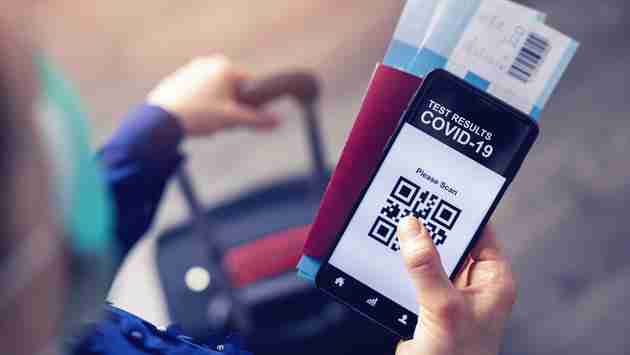The global travel industry seems to be in agreement that a secure, electronic documentation system for verifying travelers’ ID information (like a traditional passport) and linked to their COVID-19 test results and vaccination records, will be key to restarting international travel on any meaningful level.

But, the road to realizing such a universally-recognized verification system is fraught with logistical challenges, and the integration of technologies that will be required to support it are still in the experimental stages. The U.K.’s Royal Society released a paper earlier this month detailing 12 criteria that would need to be met in order for such so-called COVID-19 vaccine passports to work effectively.
Melinda Mills, director of the Leverhulme Centre for Demographic Science at the University of Oxford and the paper’s lead author, told Forbes , “International standardization is one of the criteria we believe essential." In part, the report itself reads, “Current evidence and precedents suggest that a COVID-19 vaccine passport system is feasible, but that not all criteria have yet been satisfied.”
But, multiple countries, as well as various industry organizations and tech companies, are already working to realize the concept. In Europe, the race is on to create a standardized COVID-19 vaccination passport that would enable its holders to cross national borders without the hassles of quarantine and testing before the summer vacation season starts. The push is being led by Greece, which relies on tourism for one-fifth of its GDP and which suffered drastic economic losses due to the scarcity of visitors last summer.
Alex Patelis, the chief economic advisor to Greece’s prime minister, explained, "We call them certificates, not passports." He said, "Ultimately, certificates need some sort of unique QR code," and that, “Greece is working on a number of bilateral agreements with third countries to allow mutual recognition of vaccination certificates." Greece is currently running a trial of its vaccine certificate program through agreements with Cyprus and Israel.
In January, some U.S. airlines began using a third-party app called VeriFLY in order to make the process of verifying that passengers have met their COVID-19 testing requirements for entering the United States more seamless.
The International Air Transport Association (IATA) said back in November that it was in the final stages of creating its ‘ IATA Travel Pass ’ mobile app, which had already been in development for some months. Like the ‘ CommonPass ’—another digital health passport being developed by The Commons Project, a non-profit foundation backed by the World Economic Forum—it seeks to supply an interoperable software platform that can integrate with advanced identification and cloud-based technologies, linking directly to users’ lab results and vaccination records securely and in real-time.
As more and more people get vaccinated, the demand for this type of digital product—with enough built-in flexibility to support the varying health requirements of the world’s nations, plus evolving immunization and testing standards of the future—will doubtlessly increase. And, the urgency of the situation, in terms of the travel industry’s need to recover as quickly as possible, is sure to inspire new heights of technological innovation.

Leave a Reply